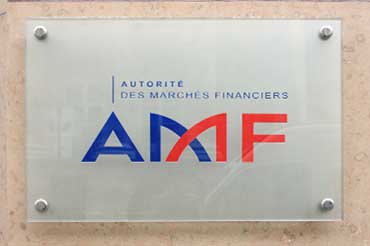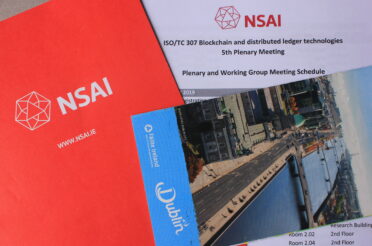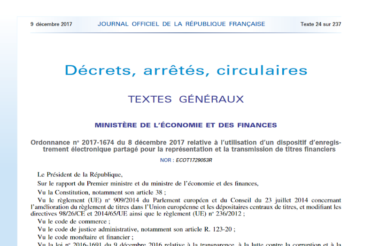II - France's ambitions for blockchain in the European Union
(Read the first part)
"It is in French law that, for the first time in Europe, we are going to set the legal and security conditions under which decentralized financial transactions on the Internet, called blockchain, can be carried out."
To understand this statement of the French Prime Minister, it is important to take into account two criteria: the Government wants to make France an attractive place for French and foreign startups and wants to serve as a model for future European regulations.
An attractive place for startups
France's desire to be the first to regulate the use of blockchain is linked to the race led by the Government to make Paris the capital of "Smart finance" in Europe.
To convince himself of this, Manuel Valls reports the words of John Chambers, the president of CISCO, who considers France as "the Silicon Valley of Europe".
Nevertheless, France is not necessarily a winner when compared to other European Union countries. In an article in the Harvard Business Review, France was shown, for the period 2008-2013, as a country losing speed in digital matters. Aware of this delay, the government has multiplied initiatives to catch up. The use of blockchain seems to be only one measure among others to restore the image of the country.
However, by persisting in sidelining Bitcoin, it is not certain that the members of the Government understand what blockchain really is. While the Prime Minister's objectives are very ambitious, France is not the only country in Europe to be interested in this new technology; other states are doing so, but in cooperation with the Bitcoin Community.
For example, from November to December 2014, the British government launched a consultation on digital currencies. More than 120 responses were made to this call, including both major players in the British economy and institutions, as well as universities or top schools. What is particularly interesting is that a very large number of different actors from the crypto-currency community around the world were involved, such as Bitcoin Magazine, Coinbase, Circle, Dogecoin, Greencoin, Bitnet, Bitpay, BitReserve, Ripple Labs, SatoshiPoint, Financial Supervision Commission, Isle of Man etc.
As a result of this study, the UK government announced in October 2015 that it was working on creating an appropriate regime for virtual currency-related businesses in order to attract foreign investors and companies to the UK.
More recently in Poland, the Ministry of Digital Affairs published a strategy paper in February 2016 that Bitcoin, blockchain and connected objects could help the country's development. Extensive discussions between the Ministry and the Bitcoin community and local blockchain companies then began. On June 20, the Polish government announced the creation of a major digitalization plan, one of the points of which was blockchain and cryptocurrencies.
These states can compete with the French state in its desire to be a model for the creation of law related to blockchain and cryptocurrencies in the European Union.
A model for future European regulations
In his speech, Mr. Manuel Valls called for "a Europe that keeps control of its rules in financial matters." This statement, combined with the fact that France will be the first to regulate blockchain in Europe, allows us to read between the lines that the Prime Minister wants the future French regulation to serve as a model for the European Union.
While there is currently no European regulation specific to blockchain and cryptocurrencies, the various European institutions and organizations are in the midst of discussions and reflections on these topics.
For example, the European Securities and Markets Authority (ESMA) published two public consultations on blockchain and distributed ledgers in 2015 and 2016. While it is regrettable that there were no responses from French institutions to the first consultation, it is gratifying that members of the Bitcoin Community participated.
In May 2016, the European Parliament's Committee on Economic and Monetary Affairs concluded in its report on "Virtual Currencies" that "it must be observed, however, that early regulation cannot be adapted to an ever-changing reality, and is likely to send the wrong message to the public about the benefits or security of virtual currencies."
Nevertheless, the European Commission has just proposed in July 2016 the modification of the anti-money laundering directive in order to include virtual currencies in particular.
We can therefore see the emergence of two currents: one security-oriented that aims to regulate the use of cryptocurrencies and a second that considers it too early to regulate a rapidly evolving technology such as the blockchain.
If the French state intends to influence the European Union in the creation of this new law, it has no guarantee of being followed by the European institutions and other member states. Moreover, it will face many challenges to successfully implement its new regulation.
Sources :
bitcoin.fr/axelle-lemaire-non-au-bitcoin-oui-a-la-blockchain/
hbr.org/2015/02/where-the-digital-economy-is-moving-the-fastest
www.gov.uk/government/speeches/digital-transformation-in-government-and-blockchain-technology
www.coindesk.com/poland-explore-blockchain-tech-government-digitization-effort/
bitcoin.fr/appel-de-l-esma/#more-1039
bitcoin.fr/eloge-du-bitcoin-au-parlement-europeen
www.europarl.europa.eu/sides/getDoc.do?pubRef=-//EP//NONSGML+REPORT+A8-2016-0168+0+DOC+PDF+V0//FR
bitcoin.fr/commission-europeenne-vers-une-nouvelle-directive-pour-bitcoin
This article was first published on: www.bitcoin.fr







2 Responses
France wants to be the first to regulate blockchain in Europe (1/3) | Cabinet Michelle Abraham
[…] Read the second part of this article → […]
France wants to be the first to regulate blockchain in Europe (3/3) | Cabinet Michelle Abraham
[…] (Read : first part – second part) […]